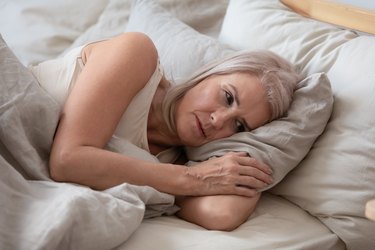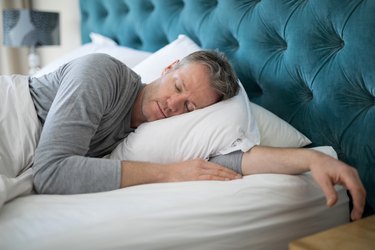
If you're an older adult, you may feel a bit too well-acquainted with the pre-dawn hours. With age, sleeping through the night — and clocking deep, high-quality sleep — gets trickier. It's enough to make you wistful for your teen years, when even bright sunshine or blaring alarm clocks wouldn't stand in the way of shut-eye.
Somewhere between 40 and 70 percent of older adults may experience chronic sleep problems, per a March 2017 review in Sleep Medicine Clinics.
Video of the Day
Video of the Day
Here are a few reasons why you might find it challenging to get to sleep — or stay asleep through the night — as you take more trips around the sun.
Do Older Adults Need Less Sleep?
Because the struggle to sleep is so commonly associated with aging, you may think older adults simply need less sleep. Not so! That’s a myth, per the National Institute on Aging (NIA).
“Aging does not imply a lesser need for sleep,” Abhinav Singh, MD, facility director of the Indiana Sleep Center and member of the National Sleep Foundation medical advisory board, tells LIVESTRONG.com. “As we age, our sleep needs remain consistent,” he says.
That is, older adults still need to log seven to nine hours a night, per the NIA.
1. You Have Certain Health Conditions
Many health conditions and disorders — including heartburn, arthritis, heart failure and lung disease — can make it harder to sleep at night, per the American Academy of Sleep Medicine (AASM).
Sleep disorders, such as sleep apnea, and movement disorders, such as restless leg syndrome, can also make it difficult for anyone, including older adults, to sleep, per the AASM.
Going through menopause — known for causing night sweats and sleep problems — can also prevent restful shut-eye.
Bottom line: As you get older, you're more likely to be medically complicated, says sleep specialist Michael Breus, PhD, author of The Power of When.
2. You Have to Pee More
This could be due to a medical condition, such as an enlarged prostate, which you're more likely to experience with age. Or it could be the result of medications — for example, if you take a diuretic for your blood pressure, you may need to pee more frequently, per Harvard Health Publishing.
No matter the cause, visits to the restroom during the night disrupt your sleep.
Aside from making you pee, some medications also cause insomnia or disrupt sleep as a side effect, per Harvard Health Publishing.
3. It Could Be Evolutionary
Often, older adults fall asleep early — too early — and then wake up at 4 a.m. and can't return to sleep, per the AASM.
"We know it happens, but we don't know why it happens," Dr. Singh says.
But one theory, he says, is that this may be an adaptation based on ancient needs of our species.
"There are some evolutionary sleep specialists who say this is an adaptation for guarding the species," Dr. Singh notes — that is, healthy, strong young adults and adolescents (who often skew toward being night owls) would stay up late and guard everyone. Then, in the very early hours before sunrise, "when even the predators are tired, you'd hand it over to the elders of the tribe," Dr. Singh says.
4. You’re Getting Less Deep Sleep
It's not just the quantity of sleep that shifts — the quality changes too. Older adults tend to get less deep sleep (aka slow-wave sleep) and REM sleep each night, per the Sleep Medicines Clinic review.
The "why" behind this shift remains mysterious. "We don't know why their percentage of deep sleep reduces," Dr. Singh says.
5. You Have More Pain and Discomfort
Many health conditions that are common as you get older, such as osteoarthritis and osteoporosis, cause pain, Breus points out. And pain makes it more difficult to drift off.
Plus, as people age, the subcutaneous layer of skin — that's the third layer in, beyond both the epidermis and dermis, per the U.S. National Library of Medicine (NLM) — becomes thinner, Breus says.
Having a thinner subcutaneous "lowers the amount of cushioning that you have, which makes it more difficult to find surfaces on which to sleep that are comfortable," Breus says.
6. Your Circadian Rhythm Has Changed
All sorts of things in your body run on a 24-hour clock, including your eating habits and body temperature, per the National Institutes of Health. One of the real biggies dictated by your circadian rhythm is your sleep-wake cycle.
All this changes with age: There's a "natural circadian shift that happens as people get older," Brues says. Melatonin — aka the hormone that triggers the feeling of sleepiness — is both produced and released earlier in the body's circadian cycle, he says. Your body also produces less melatonin overall, per the American Academy of Family Physicians.
The end result: Instead of being sleepy at say, 10 p.m., your body is ready for sleep earlier (at 9, or even 8 o'clock).
Related Reading
8 Tips to Help You Sleep Better

There's not much you can do about an evolutionary pull or natural hormonal shifts that accompany more years alive. But there are tactics you can try to encourage healthy sleep patterns and improve your overall sleep quality.
- Be strategic with your medications: Sort out any medications you're taking, and aim to take the ones that are sedating at night, Dr. Singh suggests. Then, schedule medications that are sleep-disrupting (such as diuretics) for early in the day, he says. Before making any medication adjustments, always check with a pharmacist or your health care provider.
- Stop drinking early: Drink a lot in the evening, and you'll wind up needing to use the restroom at night. Aim to stop drinking fluids about three to four hours before your bedtime, Dr. Singh suggests.
- Update your sleep area: If pain or discomfort are factors preventing you from clocking a good night's sleep, a new sleep set-up might help, Breus says. When patients have upper neck and shoulder pain, he recommends replacing their pillow, and for lower back pain, he suggests getting a new topper or even a new mattress.
- Experiment with bright lights: In general, sleep experts strongly recommend against bright lights in the evening (think: the glow of your TV screen and phone or even LED light bulbs) because this type of light delays your sleep. But if you find that you get sleepy earlier in the evening than you want, using bright lights will help push your sleep later, so you naturally wake up closer to 6 or 7 a.m. (instead of 3 or 4 a.m.), Dr. Singh says.
- Get moving: For older adults, exercise delivers a trio of wins when it comes to sleep — falling asleep faster, staying asleep longer and getting better quality sleep, per the Sleep Foundation.
- Stay away from naps: Anything longer than 20 minutes will cut into your ability to sleep during the night, Dr. Singh says — that includes inadvertent naps, like shut-eye while the TV is on, he says.
- Be cautious with caffeine: Coffee stays in your system longer than you may think — an afternoon cup of coffee will still be present in your body hours after you drink it, Dr. Singh notes. Cut yourself off from caffeinated beverages at least three or four hours before bed, per the NLM. And move your cutoff time to earlier in the day if you suspect your afternoon latte or cup of tea is making you sleep poorly. Avoid alcohol and cigarettes, too, Dr. Singh says.
- Get sunshine during the day: A dose of sunlight in the morning helps synchronize your circadian rhythm, Dr. Singh says.
- Sleep Medicine Clinics: "Sleep in the Aging Population"
- National Institute on Aging: "10 Myths About Aging"
- American Academy of Sleep Medicine: "Sleep and Growing Older"
- Harvard Health Publishing: "Medications that can affect sleep"
- U.S. National Library of Medicine: "Aging changes in skin"
- National Institute of Health: "Circadian Rhythms"
- American Academy of Family Physicians: "Sleep Changes in Older Adults"
- Sleep Foundation: "Aging and Sleep"
- NLM: "Aging changes in sleep"
- Mayo Clinic: "Caffeine: How much is too much?"
Is this an emergency? If you are experiencing serious medical symptoms, please see the National Library of Medicine’s list of signs you need emergency medical attention or call 911.